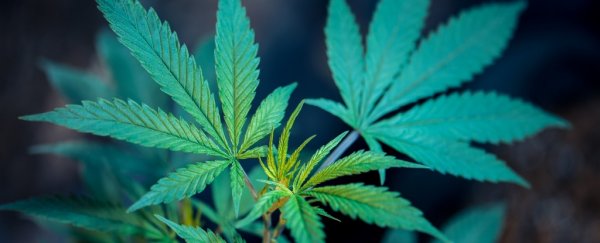After months of debate, the Australian Capital Territory has become the very first jurisdiction in the nation to pass a law allowing the recreational use of marijuana.
Starting sometime in the new year, adults living in Australia's capital city Canberra and its surrounding territory will be allowed to personally possess and grow small amounts of cannabis.
The bill, which was passed this week and will likely take effect on 31 January 2020, would specifically allow two cannabis plants to be grown per adult with a maximum of four plants per household. What's more, under this new law, each adult would be allowed to possess up to 50 grams of marijuana on their person.
"The passage of this legislation is an Australian first," said Labour party lawmaker Michael Pettersson, according to The New York Times.
"It will work to reduce the harm of drugs in our community by reducing the stigma of drug use and encouraging people to seek help without fear of arrest."
Marijuana is Australia's most popular illicit drug, and while it is still illegal at a federal level, each state or territory in the nation treats it in a slightly different way.
Under the ACT's current law, possession of 50 grams would land you a possible AU$160 fine, and any more could set you back AU$8,000 or two years in prison. Maybe even both.
Of course, there are still plenty of limitations for marijuana use in the new bill. Strict measures are in place, for instance, to make sure that the drug cannot consumed in public or anywhere near children. The cannabis plant also cannot be grown in public, and when the buds are finally cultivated they must be stored away from children.
A review of the bill from the Australian Medical Association acknowledges that cannabis use can "lead to adverse chronic health outcomes" but that "the risk of these outcomes are low and those who use cannabis occasionally are unlikely to be affected."
In 2016, the Australian Parliament passed an amendment allowing marijuana to be legally grown for medical and scientific purposes. But it has neither legalised nor decriminalised recreational use.
Pettersson doesn't think this is a problem for the ACT. But while he's convinced the federal government will not step in, this sort of intervention isn't unprecedented. In 2013, when the ACT legalised same-sex marriage, the Commonwealth government took it to the High Court and got it revoked.
Plus, even without that happening, it's currently unclear whether residents in the ACT will be arrested or prosecuted by federal officials for using marijuana.
"This does not entirely remove the risk of people being arrested under Commonwealth law, and we are being up front with the community about that," admitted ACT Attorney-General Gordon Ramsay, while speaking on the bill this week.
"The ACT's legislation attempts to provide a clear and specific legal defence to an adult who possesses small amounts of cannabis in the ACT, but is prosecuted under Commonwealth law."
In other words, the territory has little control over whether someone is cuffed or prosecuted for marijuana possession. Yet according to the Australian Broadcasting Corporation, the ACT police have assured officials they understand and respect what the ACT government is trying to do, and that they will be focusing more on the black-market selling of marijuana than its personal consumption.
It remains to be seen how this historic new law shakes out, or whether any other jurisdictions will follow suit.
A national drug survey from 2016 found that a majority of Australians support the decriminalisation of cannabis, and a growing number support full legislation. To date, only the ACT, South Australia and the Northern Territory have decriminalised the drug.
